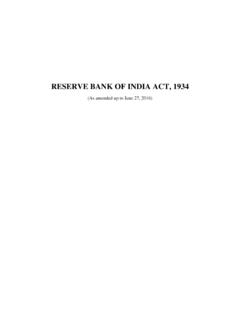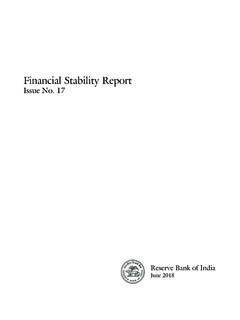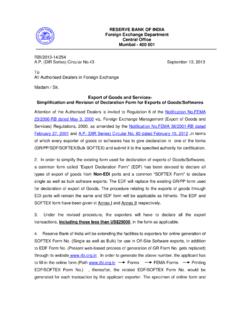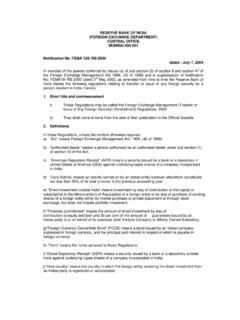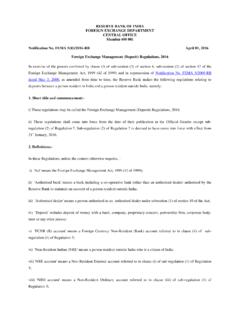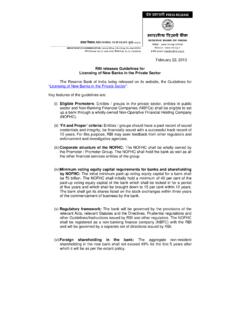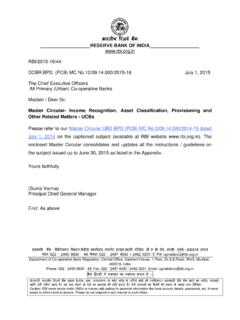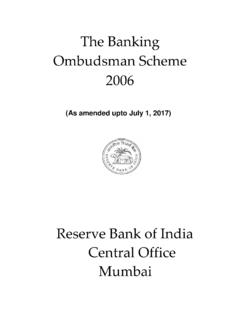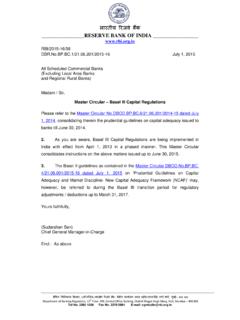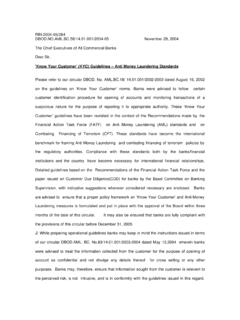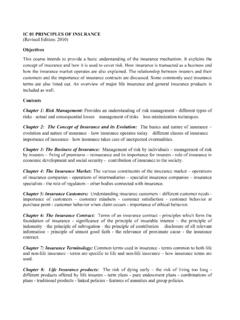Transcription of RBI/DPSS/2019-20/174 - Reserve Bank of India
1 , , 14 , , , , - 400001 Tel: (91-22) 2264 4995; Fax: (91-22) 22691557; - e-mail : Department of Payment and Settlement Systems, Central Office, 14th Floor, Central Office Building, Shahid Bhagat Singh Marg, Fort, Mumbai - 400001 RBI/ dpss / 2019 -20/174 March 17, 2020 (Updated as on November 17, 2020) All Payment System Providers and System Participants Madam / Sir, guidelines on Regulation of Payment Aggregators and Payment Gateways This has reference to Reserve bank of India (RBI) circular dated November 24, 2009 on directions for opening and operation of accounts and settlement of payments for electronic payment transactions involving intermediaries.
2 2. A reference is also invited to the discussion paper placed on the RBI website on guidelines for regulation of Payment Aggregators (PAs) and Payment Gateways (PGs). Based on the feedback received and taking into account the important functions of these intermediaries in the online payments space as also keeping in view their role vis- -vis handling funds, it has been decided to (a) regulate in entirety the activities of PAs as per the guidelines in Annex 1, and (b) provide baseline technology-related recommendations to PGs as per Annex 2. 3. Detailed guidelines to this end are appended. It may be noted that these guidelines are issued under Section 18 read with Section 10(2) of the Payment and Settlement Systems Act, 2007 and shall come into effect from April 1, 2020 other than for activities for which specific timelines are mentioned.
3 Yours faithfully, (P. Vasudevan) Chief General Manager Encl. : As above Page 2 of 21 Annex 1 guidelines on Regulation of Payment Aggregators and Payment Gateways ( dated March 17, 2020) Payment Aggregators (PAs) and Payment Gateways (PGs) are intermediaries playing an important function in facilitating payments in the online space. 1. Definitions For the purpose of this circular, the PAs and PGs are defined as under: PAs are entities that facilitate e-commerce sites and merchants to accept various payment instruments from the customers for completion of their payment obligations without the need for merchants to create a separate payment integration system of their own. PAs facilitate merchants to connect with acquirers. In the process, they receive payments from customers, pool and transfer them on to the merchants after a time period.
4 PGs are entities that provide technology infrastructure to route and facilitate processing of an online payment transaction without any involvement in handling of funds. In the processing of an online transaction the following timelines are involved: Tp date of charge / debit to the customer s account against the purchase of goods / services. Ts date of intimation by the merchant to the intermediary about shipment of goods. Td date of confirmation by the merchant to the intermediary about delivery of goods to the customer. Tr date of expiry of refund period as fixed by the merchant. 2. Applicability The guidelines shall be applicable to PAs. PAs shall also adopt the technology-related recommendations provided in Annex 2. As a measure of good practice, the PGs may adhere to these baseline technology-related recommendations.
5 Domestic leg of import and export related payments facilitated by PAs shall also be governed by these instructions. The guidelines are not applicable to Cash on Delivery (CoD) e-commerce model. Page 3 of 21 3. Authorisation The criteria of authorisation has been arrived at based on the role of the intermediary in handling of funds. bank and non- bank PAs handle funds as part of their activities. Banks, however, provide PA services as part of their normal banking relationship and do not therefore require a separate authorisation from RBI. Non- bank PAs shall require authorisation from RBI under the Payment and Settlement Systems Act, 2007 (PSSA). PA shall be a company incorporated in India under the Companies Act, 1956 / 2013. The Memorandum of Association (MoA) of the applicant entity must cover the proposed activity of operating as a PA.
6 Existing non- bank entities offering PA services shall apply for authorisation on or before June 30, 2021. They shall be allowed to continue their operations till they receive communication from RBI regarding the fate of their application. Entities seeking authorisation as PA from the RBI under the PSS Act, shall apply in Form A to the Department of Payment and Settlement Systems ( dpss ), RBI, Central Office, Mumbai. Entities regulated by any of the financial sector regulators shall apply along with a No Objection Certificate from their respective regulator, within 45 days of obtaining such a clearance. E-commerce marketplaces providing PA services shall not continue this activity beyond the deadline prescribed at clause above. If they desire to pursue this activity, it shall be separated from the marketplace business and they shall apply for authorisation on or before June 30, 2021.
7 PGs shall be considered as technology providers or outsourcing partners of banks or non-banks, as the case may be. In case of a bank PG, the guidelines issued by Reserve bank of India , Department of Regulation (DoR) vide circular dated November 3, 2006 on Managing Risks and Code of Conduct in Outsourcing of Financial Services by banks and other follow up circular(s) shall also be applicable. 4. Capital Requirements PAs existing as on the date of this circular shall achieve a net-worth of 15 crore by March 31, 2021 and a net-worth of 25 crore by the end of third financial year, , on or before March 31, 2023. The net-worth of 25 crore shall be maintained at all times thereafter. New PAs shall have a minimum net-worth of 15 crore at the time of application for authorisation and shall attain a net-worth of 25 crore by the end of third financial year of grant of authorisation.
8 The net-worth of 25 crore shall be maintained at all times thereafter. Page 4 of 21 Illustratively, Non- bank Entity Date of Application / Authorisation Date of Achieving 15 Cr. Net-worth Date of Achieving 25 Cr. Net-worth Existing PAs Up to 30/06/2021 Date of application or 31/03/2021 whichever is earlier 31/03/2023 New PAs 20/03/2020 01/04/2020 01/03/2021 01/04/2021 On date of application 31/03/2022 31/03/2023 31/03/2023 31/03/2024 Net-worth shall consist of paid-up equity capital, preference shares that are compulsorily convertible to equity, free reserves, balance in share premium account and capital reserves representing surplus arising out of sale proceeds of assets but not reserves created by revaluation of assets adjusted for accumulated loss balance, book value of intangible assets and deferred revenue expenditure, if any.
9 Compulsorily convertible preference shares can be either non-cumulative or cumulative, and they should be compulsorily convertible into equity shares and the shareholder agreements should specifically prohibit any withdrawal of this preference capital at any time. Entities having Foreign Direct Investment (FDI) shall be guided by the Consolidated Foreign Direct Investment policy of the Government of India and the relevant foreign exchange management regulations on this subject. PAs shall submit a certificate in the enclosed format from their Chartered Accountants (CA) to evidence compliance with the applicable net-worth requirement while submitting the application for authorisation. Newly incorporated non- bank entities which may not have an audited statement of financial accounts shall submit a certificate in the enclosed format from their Chartered Accountants regarding the current net-worth along with provisional balance sheet.
10 PAs that are not able to comply with the net-worth requirement within the stipulated time frame (as given at clauses & ) shall wind-up payment aggregation business. The banks maintaining nodal / escrow accounts of such entities shall monitor and report compliance in this regard. 5. Governance PAs shall be professionally managed. The promoters of the entity shall satisfy the fit and proper criteria prescribed by RBI. The directors of the applicant entity shall submit a declaration in the enclosed format. RBI shall also check fit and proper status of the applicant entity and management by obtaining inputs from other regulators, government departments, etc., as Page 5 of 21 deemed fit. Applications of those entities not meeting the eligibility criteria, or those which are incomplete / not in the prescribed form with all details, shall be returned.
